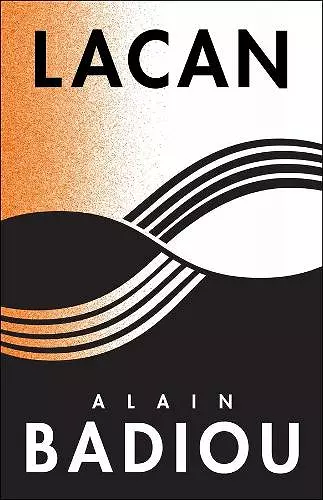Lacan
Anti-Philosophy 3
Alain Badiou author Kenneth Reinhard translator Susan Spitzer translator
Format:Paperback
Publisher:Columbia University Press
Published:15th Dec '20
Should be back in stock very soon

Alain Badiou is arguably the most significant philosopher in Europe today. Badiou’s seminars, given annually on major conceptual and historical topics, constitute an enormously important part of his work. They served as laboratories for his thought and public illuminations of his complex ideas yet remain little known. This book, the transcript of Badiou’s year-long seminar on the psychoanalytic theory of Jacques Lacan, is the first volume of his seminars to be published in English, opening up a new and vital aspect of his thinking.
In a highly original and compelling account of Lacan’s theory and therapeutic practice, Badiou considers the challenge that Lacan poses to fundamental philosophical topics such as being, the subject, and truth. Badiou argues that Lacan is a singular figure of the “anti-philosopher,” a series of thinkers stretching back to Saint Paul and including Kierkegaard and Nietzsche, with Lacan as the last great anti-philosopher of modernity. The book offers a forceful reading of an enigmatic yet foundational thinker and sheds light on the crucial role that Lacan plays in Badiou’s own thought. This seminar, more accessible than some of Badiou’s more difficult works, will be profoundly valuable for the many readers across academic disciplines, art and literature, and political activism who find his thought essential.
Badiou's seminar is much more than yet another book on Lacan—it is a book with Lacan, a unique experience of the intense dialogue of a great philosopher with another great thinker. It does not render Badiou's thoughts on Lacan—it renders the living process in which we can witness the gestation of deep insights. A book for everyone who wants to see how thinking works. -- Slavoj Žižek, author of Less Than Nothing and Absolute Recoil
Badiou’s ‘antiphilosophy’—situated at the antipodes of moral philosophy and launching a challenge to the authority of philosophy as institutional pedagogy—turns crucially on the seminar he devoted to Jacques Lacan from 1994 to 1995. Lacan, a rebel with a cause, will stand alongside Nietzsche, Wittgenstein, and Saint Paul in Badiou’s confraternity of thinkers outside the norm. Hysterical master, ontologist of the matheme, philosopher of conditions (of politics, of desire), apologist of acts that come to being in being said, theorist sans pareil of the ‘real’ in the real world, of the impasse enabling something rare and extraordinary—each Lacan in due course proved fundamental to resolving the 'subject of freedom' problem that gripped Badiou in the long aftermath of May '68 and informed his magisterial Being and Event. In this lucidly translated and brilliantly introduced transposition of a teaching-event—the ‘Badiou-Lacan event’—the participant enters a transfixing world of theory as it happens. Badiou’s seminar, much like Lacan’s, is something between an art form, a politics of assembly, a Brechtian theater of shake-up, a lesson on indifference in its relation to sexual difference, and a learning curve in classical formalization. Be warned, you are on course to experience philosophy at the break of noon! -- Emily Apter, author of Unexceptional Politics On Obstruction, Impasse, and the Impolitic
'Living philosophy.' This is what this auspicious first volume of the seminars of Badiou reads like. Through it we get to hear one of the greatest philosophers of our time grapple with the astonishing ideas of another, one of his own teachers: Jacques Lacan. Both exciting and rewarding, it simply cannot be passed up. -- Joan Copjec, author of Read My Desire: Lacan Against the Historicists
Badiou has always seen Lacan as both a key ally and rival for any contemporary theory of the subject, in particular one that seeks nothing less than to make possible what initially seems impossible. There is no better way to grasp what’s at stake in this sympathetic rivalry than to read this engaging and lucid seminar, which is here deftly translated and presented by two of Badiou’s most faithful collaborators. -- Peter Hallward, author of Badiou: A Subject to Truth
In today’s theoretical humanities, Jacques Lacan and Alain Badiou are by far two of the most important and frequently referenced figures. Along with Slavoj Žižek, Badiou is rightly seen as profoundly shaping contemporary philosophy/theory along lines flowing directly out of Lacan’s teachings. Through a historical narrative running from ancient Greece through the postmodern Western world, Badiou defines philosophy partly through his characterizations of antiphilosophy. Hence, these seminars, including the one on Lacan, are crucial for an adequate appreciation of Badiou’s vision of philosophy tout court. -- Adrian Johnston, author of A New German Idealism
Reinhard and Spitzer have produced a glittering translation that faithfully captures Badiou’s trademark style: by turns erudite, brash, and amusing. * Notre Dame Philosophical Reviews *
This text provides a synthesis of Badiou's long-standing defense of philosophy (here vis-à-vis Lacan's circumventions) and presents Lacan's relation to Heidegger's thinking in an original and perhaps definitive fashion. . . . Highly recommended. * Choice *
This volume is crucial for getting oriented to Badiou’s own orientation to Lacan, the ‘triangulation of love, politics, and mathematics’ in particular, as well as his suspicion of the hermeneutic impulses of philosophy. -- Anthony Ballas * Marx and Philosophy Review of Books *
Superbly edited and indexed, with first-rate introductions and footnotes. * The Year's Work in Critical and Cultural Theory *
Badiou’s preface is well worth reading, as he chronicles his own remarkable career as a thinker and educator. * European Legacy *
ISBN: 9780231171496
Dimensions: unknown
Weight: unknown
312 pages